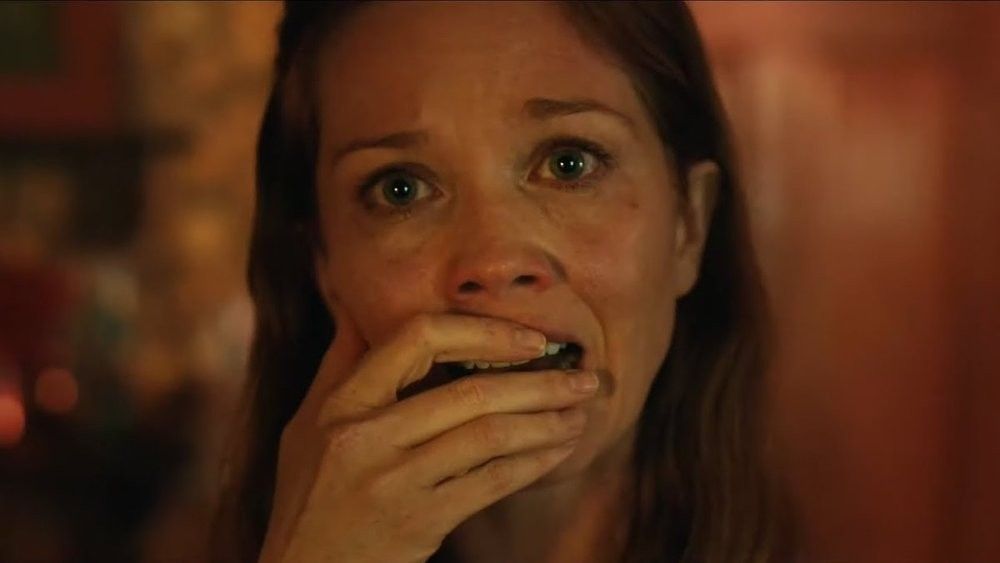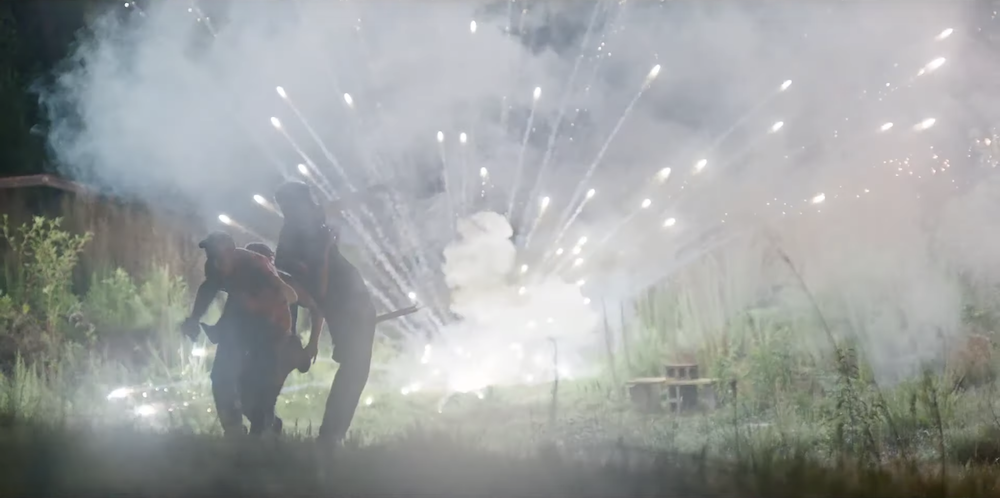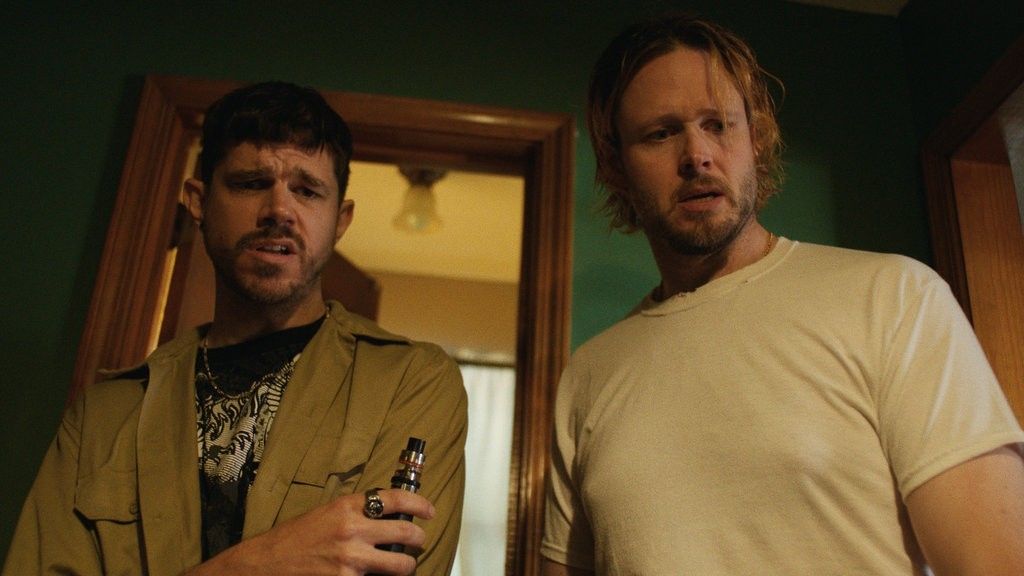
How did Daniel Scheinert pull off The Death of Dick Long?
It's less and less common to see a movie that truly surprises you. Mark my words: you will be surprised by The Death of Dick Long.
We don't see a lot of movies anymore that walk the fine line between comedy and drama. That combine, in every step along that tight-rope, the ability to make us laugh, cringe, and recoil. The Death of Dick Long connects on a comedic level without grasping at the nearest jokes, and without trouncing on anyone's way of life. In fact, it goes out of its way to humanize the very people we laugh at.
It humanizes them to the point where we suddenly also connect on a dramatic level, feeling deep compassion and sympathy for the ridiculous plight of its leads.
The premise of the movie is simple enough: a few buddies are partying, decide to 'get weird', and some bad things happen. The story is about the repercussions of that night.

The movie is a class on dramatic tension. Peeling back layers so the audience knows just what they need to, sometimes a step ahead of some characters, sometimes a step behind. In every instance, on the edge of their seats. The comedy and the drama are born from that precise engineering.
On top of all that?
The movie is packed with subtext. Interpretations can run in many directions. It's fun just to think about it. Whatever you do, make sure you see it in a theater.
How does a filmmaker do all of that? How does a filmmaker get money to do all of that? This isn't the type of movie that is very easy to get made.
Even more questions pour in when you wonder how Daniel Scheinert steered this ship so carefully and assuredly in such treacherous story waters. We were lucky enough to get to speak with Scheinert about the long road the project took to getting made, and how he worked with the writer, cast, and crew to deliver something so unique.
No Film School: First off, how did you get involved with Death of Dick Long? Did you know [screenwriter] Billy Chew in advance before he wrote it? What's the story behind this movie? Where did it begin?
Daniel Scheinert: Yeah, uh, Billy was one of my best friends in college. The first time I read the script, I just read the first 30 pages, and it was in like 2010 or 2011 or something. I was like, "Oh wow, my...my friend, uh, one of my close friends Billy is the best screenwriter I've ever met. " I've grown alongside every draft of the movie for 10 years. I've known Billy a little bit longer than Dan Kwan and he's been part of our team all along. Then there was a moment a few years ago where Billy was trying to get this project off the ground and I'm his biggest fan so I thought "Maybe I can help." And he was like, "You should just direct it, Daniel." So, we went and we started trying to put it together.
NFS: That first 30 pages that you read ten years ago, how consistent is it with the finished movie we have today?
Scheinert: It's very similar. The first draft included the scene with Zeke taking his daughter to the gas station and her going in to talk to the police. The palpable tension I felt in that sequence and the ensuing farcical sequences of events with the bloodstain and the police and what Zeke can and can't say... I just thought, "Oh my god. I feel like I'm watching a movie while I read it. This is great." So that was that of the moment, really that scene was the part of the first draft that made me say, "Keep going, Billy!"
"When people see the movie they'll be like, 'What the fuck?!'"
NFS: The movie uses that tension for comedy but also to make it suspenseful and disturbing. How did you walk the line and keep the comedy so grounded?
Scheinert: Some of my favorite comedies are ones where I'm stressed out. That's what gets me to really cackle with laughter... when I'm nervous and invested and I don't feel like a comedian is telling me a clever joke they came up with. It feels like a human being is going through hilarious circumstances. I just generally laugh harder at Fargo than I laugh at comedy-comedies. So, I try to cast people who are funny and then ask them to take it totally seriously. I invited every department head to have a sense of humor and say 'nothing is sacred.' Let's embrace the textured, funny world that we live in. So from the shirts characters are wearing, to the cars they're driving I wanted the audience to enjoy looking around the frame and to have permission to laugh at it.

NFS: Can you tell us about shooting on location and, and making that part of the pitch to get this off the ground? It's hard to make a movie these days around an original concept, let alone one that is darkly funny... there are a lot of things about this that seem like they would have been a challenge.
Scheinert: Totally, I mean, I am lucky I had the opportunity to make this movie. I think A24 read it and thought, "Oh this is cinematic and as ballsy and crazy as it is it's also a pretty easy-to-enjoy very readable script." I pitched it to them as, "I want to go back to Alabama where I'm from and just embrace every weird texture I can find and put it on camera and make it, like, a really, colorful, fun, memorable, weird place to go." And on top of that it's going to cost way less money than a normal movie shot in L.A. because, when you go to Alabama, especially if you're from there, you can just say, "We're shooting a movie and, uh, I grew up around here," and people are psyched. You get a lot of, "How can I help? Let's donate trucks. Can you shoot at my house please?"
And so that was kind of the approach, was to go back and get involved in the community and it paid off and we didn't ask for a ton of money because we knew it was a risky movie but also it was important to the-the story that we go to real places and the bigger the crew the harder that is. So from the get-go, I was like, "I want a small team and I want to hire a lot of locals so we can go to the actual places and we're not faking the trailer park or the hospital." We just went to a trailer park and a hospital. And it was really fun.
"We tried to not base any of the jokes off of the stereotypes everyone knows about rural America. Instead, we wanted to come in as anthropologists with a sense of humor."
NFS: So many elements of the world feel grounded and real but also ridiculous without being over the top. How did you manage that?
Scheinert: As far as not doing kind of over-the-top jokes, the rule that we came up with was if you see it in real life, we're allowed to put it in the film. So, we would recreate things that made us laugh. If we found something in a thrift store, well, we found it here so someone in Alabama owned this leopard painting. Let's use it. We saw a shirtless guy smoking a cigarette while he was on an exercise bike on the front porch of his trailer looking suspiciously at us and we were like, "Well, that's great; that's in the movie." We got our location manager to take his shirt off and play the part. We tried to not base any of the jokes off of the stereotypes everyone knows about rural America. Instead, we wanted to come in as anthropologists with a sense of humor, and kind of just find weird people in weird places and try to catch 'em, you know?
NFS: The movie has a lot of twists and a lot of reveals and from a plotting standpoint you did an excellent job revealing things carefully and slowly at the right time. Can you talk us through that decision making and the balancing act of the twists and big reveals?
Scheinert: That's a credit to Billy Chew more than me. And the broad strokes of the movie didn't change much over the years. What changed was refining what makes each scene the most specific and helps the movie get at things that movies that are similar don't normally get at. It was just really important to him that we don't reveal everything too quickly or too late. A lot of movies save the twist for the ending, the audience goes like, "Gasp!" And then the credits roll... and you don't get to like explore the repercussions of secrets. That was what Billy was interested in.
NFS: I see.
Scheinert: A lot of it was about what gives the audience permission to laugh, what makes it most entertaining, and then what draws out the themes of the film so that it's not just a caper film where we ask, 'are the cops are gonna catch the guys?' But [Billy Chew] was trying to create dynamic theme work with interesting characters to get at the very personal, real-life experiences that inspired the film.

NFS: Wait... there are real-life experiences that inspired the film?
Scheinert: There absolutely are! When people see the movie they'll be like, "What the fuck?!" But Billy wrote it inspired by emotions he had felt while trapped in an unhealthy relationship as well as the dynamics in his family growing up. It wasn't about the specific incidents of the movie. This movie's not specifically autobiographical.
NFS: Ok that's good.
Scheinert: But it's about what it feels like to keep a secret and what it feels like to have a secret kept from you. The more that we brought on crew and cast that was one of the things that we all discussed. Everybody had a story that this movie became a metaphor for, you know. So like, on one hand, the movie's like a big, ballsy, jokey, crazy movie that we just thought would be fun. And on the other hand, it became personal to all of us. Each of us was like, "You know, my family kept this secret and it did these things," or like, "I was in a relationship and I did this to someone and it just tore me apart," you know?
NFS: That's amazing because, experiencing the movie, as funny and as entertaining as it is, it connects on a level that's a little disturbing, where, yeah, there's something so human and familiar about that dynamic and now I'm wondering, as a director, how did you manage, did you go into your casting and crewing trying to find collaborators who could connect to that or did that just happen magically?
Scheinert: I guess... both. It happened magically and it was something I, you know, was looking for. But I wasn't like, um, you know, "Hi, nice to meet you, you're a good cinematographer, have you ever had a secret kept from you?" I think it kind of organically happened that the script resonated with certain people and those were the people that came on board and I hired because you can kind of sense when someone got it, and uh, and didn't just wanna like, make jokes after reading the script? They wanted to like, talk about, you know, um, how it made you feel?

NFS: So connecting to the honesty, seems like, both in the location, in the depiction, but also with working with people was the core, fundamental goal for you?
Scheinert: Yeah. I think that's one of the things that kind of surprises people. Some people think it's gonna be a drama and are surprised at how funny it is and other people think it's gonna be a comedy and are then surprised at just how heartfelt it feels.
NFS: It does both things extremely well.
Scheinert: When we showed a rough cut to Virginia, who plays Lydia, she just started crying after the screening and she was like, "there's just so many guys who have these horrible experiences that I know, who just, the next morning they sober up and just bottle it up and ignore it." And there's something about the movie that just resonated with her...(laughs) and in a kind of scary way.
NFS: Speaking of which, how did you and Virginia work to capture *that* moment- and we don't want to spoil anything- but there is a moment particularly with her on camera that is quite amazing.
Scheinert: Yeah. Um, it was... it was a joint effort, I only worked with her a little and had realized that like, her first takes were great. (laughs) But she barely prepared for that scene and prepared for every other scene so that when we started shooting her closeup of the reveal, she just naturally reacted the way she reacted. It was among the top two things I've ever photographed. I was just so thrilled, like, sitting at the monitor, just being like, "Holy Cow, yay!" (laughs)

NFS: How much is too much to talk about with your collaborators? When do you say, "Okay we have to stop thinking and talking and start doing, like, as a director how do you balance?
Scheinert: It's funny, I love geeking out about movies with my friends but when I'm making them, I very much try not to get too academic. I feel like I start losing the forest for the trees. As a director, my favorite thing to do is just take someone who I think is super talented and just give them just the right nudges in the right direction so that they can like do their best work and surprise me.
This acting teacher that I met talked about like directing as like being a chemist. You just want to put like, one chemical in the test tube a drop at a time and see what happens. Otherwise, if you tweak ten things... it's bad science, you can't even tell what made a difference or know what your chemical experiment is anymore. I think about that a lot when trying for the right touch. So just one little chemical thing can just have the biggest, best effect sometimes as opposed to like, um, micro-managing and talking about it too much.
Your Comment
2 Comments
I haven't seen this yet but it looks like a blossoming filmmaker got a real shot and made something unique and cool and exactly how they wanted to. More of this please.
September 27, 2019 at 12:44PM
Ooh, is this scheduled for wide release? It looks like it's out but nowhere near me.
September 28, 2019 at 10:19AM